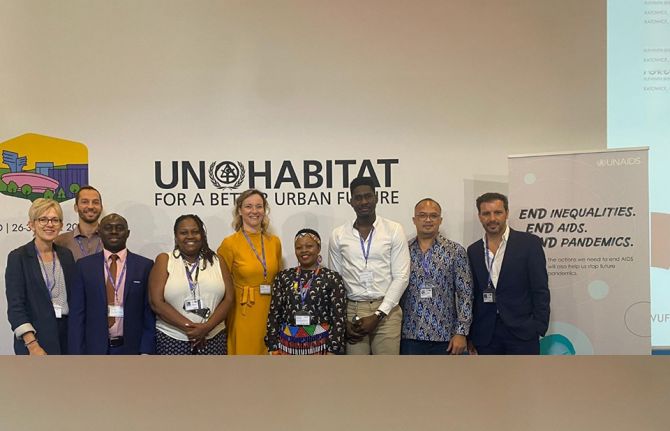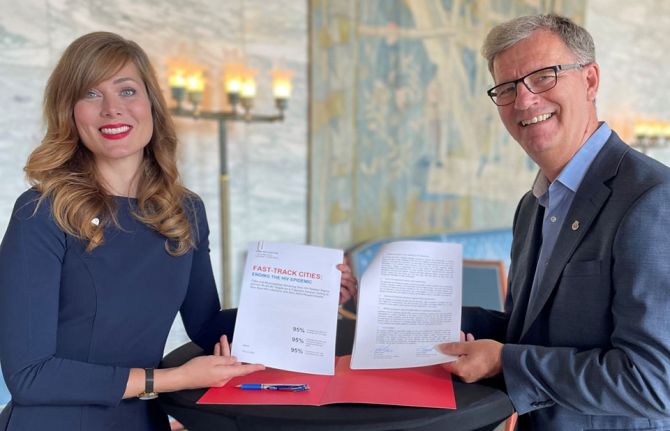
Feature Story
UNAIDS Executive Director Michel Sidibé gives guest lecture at Vatican International Study Meeting on HIV
30 May 2011
30 May 2011 30 May 2011
(From left:) Archbishop Zygmunt Zimowski, President of the Pontifical Council for the pastoral care of Health Care Workers; Michel Sidibé, Executive Director of UNAIDS.
Credit: UNAIDS
On 28 May UNAIDS Executive Director Michel Sidibé gave the guest lecture at an international study meeting, “The Centrality of Care for the Person in the Prevention and Treatment of Illnesses Caused by HIV/AIDS”. The meeting was hosted by the Pontifical Council for Health Care Workers and Good Samaritan Foundation in Rome. The event brought together experts on HIV to discuss “people-centred approaches” to the provision of HIV prevention, treatment and care services and economic support to people most in need.
Michel Sidibé engaged the audience in a passionate call for social justice in the HIV response. Highlighting recent ground breaking research on the impact of HIV Treatment for Prevention; he urged the global community to rise to the challenge of funding the global AIDS response because, “funding sustainable health care is a moral obligation, a right not a luxury.”
Funding sustainable health care is a moral obligation, a right not a luxury
Michel Sidibé, UNAIDS Executive Director
Mr Sidibé highlighted the recent results of a study in which early treatment of people living with HIV can be 96% effective in preventing sexual transmission of the HIV virus. “This is a true game changer in the AIDS response,” Mr Sidibé said. “Serodiscordant couples have another extremely effective option for HIV protection. This is very important –something we did not know a few months ago.”
Mr Sidibé described how Treatment for Prevention sits as one element in an important comprehensive set of HIV prevention approaches. UNAIDS believes it is every person's right, including young people, to have access to effective education on human sexuality, health and life skills to enable that person to make informed choices and follow through on them, including abstinence, reducing the number of sexual partners, mutual fidelity and how to use condoms consistently and correctly. Research has shown that such education does not result in increased sexual relations.
He welcomed Pope Benedict’s recent clarification of the use of condoms to prevent HIV who wrote that, “in the case of some individuals,” to use a condom for HIV prevention purposes could represent “a first assumption of responsibility.” Mr Sidibé said this statement was very important: “it has helped me to understand his position better and has opened up a new space for dialogue.”
Archbishop Zygmunt Zimowski, President of the Pontifical Council for the pastoral care of Health Care Workers, highlighted the importance of a holistic approach to HIV prevention, treatment and care in his inaugural address to the meeting.
“Thus the prevention of the sexual transmission of HIV should be approached from the perspective of the total, holistic response against the infection and its roots, no longer and not only limited to the medical-public health aspect, as important as that is.”



